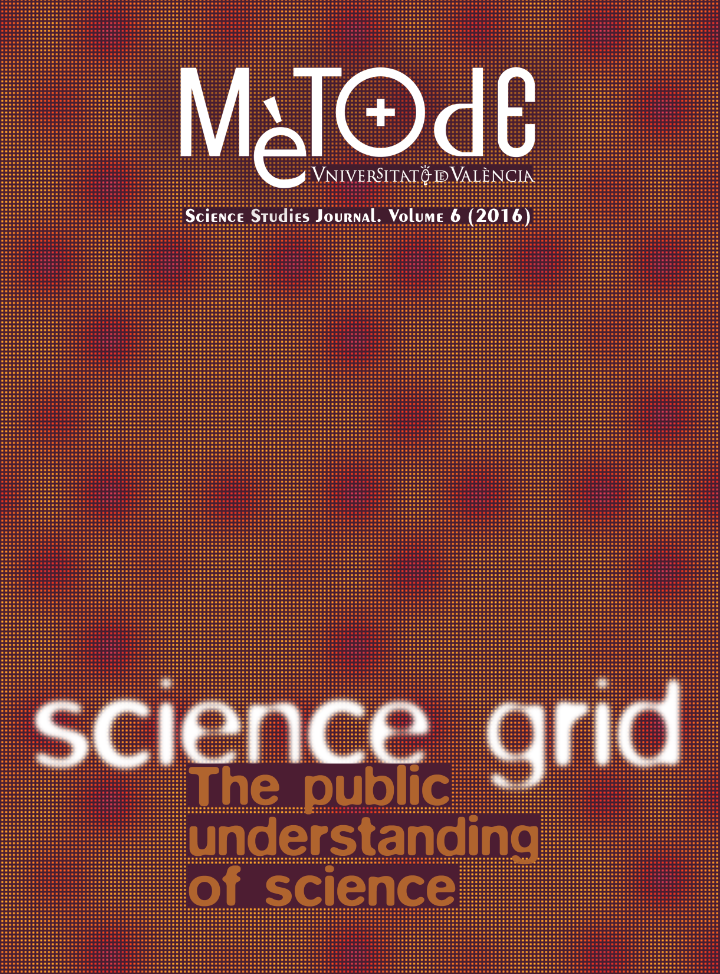Genetically modified crops 2.0: The decline of media controversy in digital journalism
DOI:
https://doi.org/10.7203/metode.6.3899Keywords:
digital journalism, environment, GM crops, biotechnology, blogs Abstract
Abstract
The controversy over the effects of GM crops on nature and health was one of the most intense media debates of the late twentieth century. Despite the existence of Web 2.0 tools for the transmission of information, the controversy is now declining in digital media, with the exception of France and the United Kingdom, where the debate is still ongoing among citizens and environmental action is constant.
 Downloads
Downloads
 References
References
Allan, S. (2009). The future of science journalism. Journalism, 10, 280. doi: 10.1177/1464884909102570
Ansell, C., Maxwell, R., & Sicurelli, D. (2006). Protesting food: NGOs and political mobilization in Europe. In C. Ansell, & D. Vogel (Eds.), What’s the beef? The contested governance of European food service. Massachusetts: MIT Press.
Arntzen, C. H., Coghlan, A., Johnson, B., Peacock, J., & Rodemeyer, M. (2003). GM crops: Science, politics and communication. Nature Reviews Genetics, 4, 839–843. doi: 10.1038/nrg1185
Barbagallo, F., & Nelson, J. (2005). UK GM dialogue: Separating social and scientific issues. Science Communication, 26, 318. doi: 10.1177/1075547004273091
Brossard, D., & Scheufele, D. A. (2013). New media, and the public. Science, 339, 40. doi: 10.1126/science.1232329
Carpenter, J. E. (2010). Peer-reviewed surveys indicate positive impact of commercialized GM crops. Nature Biotechnology, 28, 319–321. doi: 10.1038/nbt0410-319
Colson, V. (2011). Science blogs as competing channels for the dissemination of science news. Journalism, 12, 889. doi: 10.1177/1464884911412834
Cox, R. (2006). Environmental communication and the public sphere. California: Sage Publications.
Eurobarometer. (2010). Biotechnology. Special eurobarometer 341. Wave 73.1. TNS Opinion & Social. Brussels: European Commission.
Gaskell, G., Bauer, M., Allum, N. C., & Durant, J. (1999). Worlds apart? The reception of genetically modified foods in Europe and the United States. Science, 285(5426), 384–386. doi: 10.1126/science.285.5426.384
Gilbert, N. (2013). Case studies: A hard look at GM crops. Nature, 497, 24–26. doi: 10.1038/497024a
Howarth, A. (2006). Participatory politics, environmental journalism and newspaper campaigns. Journalism Studies, 13(2), 210–225. doi: 10.1080/1461670X.2011.646398
Mielby, H., Sandøe, P., & Lassen, J. (2013). The role of scientific knowledge in shaping public attitudes to GM technologies. Public Understanding of Science, 22(2), 155–168. doi: 10.1177/0963662511430577
Qaim, M., & Zilberman, D. (2003). Yield effects of genetically modified crops in developing countries. Science, 299(5608), 900–902. doi: 10.1126/science.1080609
Shaw, A., (2002). It just goes against the grain: Public understandings of genetically modified (GM) food in the UK. Public Understanding of Science, 11(3), 273–291. doi: 10.1088/0963-6625/11/3/305
Downloads
Published
How to Cite
-
Abstract1176
-
PDF321
Issue
Section
License
![]()
All the documents in the OJS platform are open access and property of their respective authors.
Authors publishing in the journal agree to the following terms:
- Authors keep the rights and guarantee Metode Science Studies Journal the right to be the first publication of the document, licensed under a Creative Commons Attribution-NonCommercial-NoDerivatives 4.0 International License that allows others to share the work with an acknowledgement of authorship and publication in the journal.
- Authors are allowed and encouraged to spread their work through electronic means using personal or institutional websites (institutional open archives, personal websites or professional and academic networks profiles) once the text has been published.





